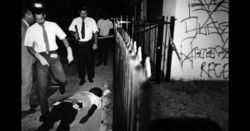Blowback
(Social change, parallel construction) | |
|---|---|
 Results of the drug war in Los Angeles in 1980s. The CIA starting a worldwide drug network gets you this. | |
| When you aid "rebels" in Syria par example but these end up switching sides and joining IS the blowback is when IS decides to shoot up your capital. |
Blowback is a term originating from within the American Intelligence apparatus, denoting the unintended consequences, unwanted side-effects, or suffered repercussions of a covert operation that fall back on those responsible for the aforementioned operations. The inspiration comes from nuclear explosions, where the radioactive dust might blow back on the wind to the sender.
To the civilians suffering the blowback of covert operations, the effect typically manifests itself as "random" acts of political violence without a discernible, direct cause; because the public—in whose name the intelligence agency acted—are unaware of the effected secret attacks that provoked revenge (counter-attack) against them.[1]
The concept was popularized by Chalmers Johnson and his book Blowback: The Costs and Consequences of American Empire[2].
Problems with the term
Originally, blowback was CIA internal coinage denoting the unintended, harmful consequences—to friendly populations and military forces — when a given weapon is used beyond its purpose as intended by the party supplying it, like when anti-Western religious warriors (e.g. Osama bin Laden) went from trusted ally in Afghanistan in the 1980s to supervillain number 1.
And here lies the problem with the term, it ascribes to incompetence what might have been done on purpose, like a strategy of tension. The term gives a strong plausible deniability for actions that still are very much connected to intelligence plans, especially since "unintended, harmful consequences—to friendly populations" is something the CIA and others are perfectly willing to accept to achieve their own purposes. For example, the cocaine that was smuggled by the Contras in the 1980s, where the alleged unforeseen blowback was a drug epidemic in American black ghettos; the more likely purpose was to weaken the potential for black political opposition.
“You want to know what this was really all about. The Nixon campaign in 1968, and the Nixon White House after that, had two enemies: the antiwar left and black people. You understand what I’m saying. We knew we couldn’t make it illegal to be either against the war or black, but by getting the public to associate the hippies with marijuana and blacks with heroin, and then criminalizing both heavily, we could disrupt those communities. We could arrest their leaders, raid their homes, break up their meetings, and vilify them night after night on the evening news. Did we know we were lying about the drugs? Of course we did.”
John Ehrlichman (1994) [3]
In the case above the criminalization and used tactic implemented as stated above were a substantial instigator for the massive drug turf-wars in the US inner cities of the 1990s.
An example
| Page name | Description |
|---|---|
| 2015 European refugee crisis | Crisis in Europe over the escalating numbers of refugees from Middle-Eastern and North African countries. |
Related Document
| Title | Type | Publication date | Author(s) | Description |
|---|---|---|---|---|
| Document:Abolish Terrorist Agencies | essay | 29 July 2019 | David Swanson | Swanson characterises Annie Jacobsen's Surprise Kill Vanish as an apology for intelligence agencies. He deconstructs their the official narratives of defending "democracy", claiming that they have "decades of engaging in and provoking terrorism". Citing blowback from their operations as major factors in the growth of the MICC and its climate paranoia and permanent war, he calls for an end to the intelligence agencies. |
References
- ↑ https://www.thenation.com/article/archive/blowback
- ↑ Blowback: The Costs and Consequences of American Empire, by Chalmers Johnson, ISBN 0-8050-6239-4
- ↑ http://harpers.org/archive/2016/04/legalize-it-all/ Harper's Magazine